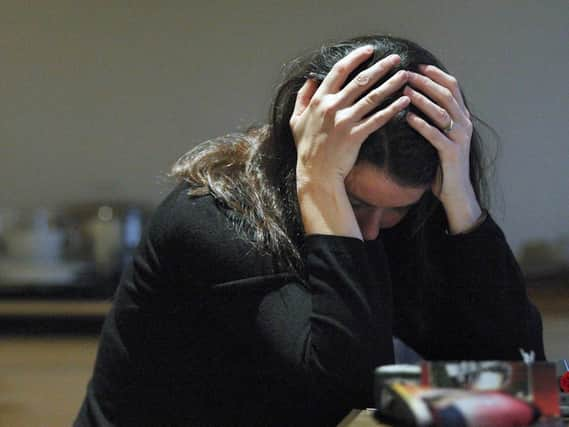'More people will die' warning in Blackpool as mental health services struggle to cope


Concerns have been raised with a government minister that staff are treating an “excessive number” of patients on the Fylde coast.
Blackpool and Fylde coroner Alan Wilson said there was a “significant risk” that some of the region’s most vulnerable people will not get the help they need, resulting in “potentially fatal consequences”.
Advertisement
Hide AdAdvertisement
Hide AdHis comments come against a backdrop of rising demand for mental health services and falling numbers of mental health nurses.
Lancashire Care NHS Foundation Trust, which provides mental health care across the county, said although the current high demand was a national problem, it was getting double the number of referrals compared to other similar trusts.
Following the inquest into the death of a mental health patient in Blackpool, Sara Moran, Mr Wilson wrote to the Department of Health to voice his concerns.
The hearing, at Blackpool Town Hall, was told Ms Moran, 46, died at her Montrose Avenue home in April last year after a morphine overdose.
Advertisement
Hide AdAdvertisement
Hide AdFollowing her death, Lancashire Care carried out a post-incident review into the care she received.
The man who led the review told the inquest the team did not have enough staff to look after the number of patients at the time.
In his report sent to the Department of Health, coroner Mr Wilson said: “This over-capacity would, in his view, have affected the quality of service afforded to Sara Moran.”
He ruled that the care given to the 46-year-old did not contribute to her death, but said he still believed “action should be taken to prevent future deaths”.
Advertisement
Hide AdAdvertisement
Hide AdHe wrote: “I am concerned that if mental health professionals are expected to provide care to an excessive number of service users – many of whom pose significant challenges –then there a genuine risk of future deaths arises as a result of this.
“Such demands, in my judgement, inevitably pose a significant risk that one or more (patients) many not receive the level of attention they need and with potentially fatal consequences.”
The inquest heard Ms Moran, also known as Sally, had a history of mental health problems and drug abuse. Following concerns for her welfare, police forced entry to her home where she was found dead in her bedroom.
A Lancashire Care spokesman said: “First and foremost, we express our sincere condolences to Sara’s family and friends for their loss.
Advertisement
Hide AdAdvertisement
Hide Ad“Mental health services are experiencing high levels of demand and this is mirrored across the country.
“Here in Lancashire we receive twice the number of referrals to our services than other similar trusts and are being proactive in putting additional resources in place to ensure that people have access to a range of support.”
In response to the coroner’s concerns, parliamentary under-secretary for health Jackie Doyle-Price said NHS trusts are responsible for ensuring they have enough staff to cope with demand.
In her letter, which is dated June 12 but which has only now been made public, she wrote: “We do recognise that, at present, further investment and development is required to ensure that all crisis resolution and home treatment teams (CRHTTs) are adequately resourced to be able to offer safe... treatment.
Advertisement
Hide AdAdvertisement
Hide Ad“NHS England is committed to ensuring that by 2021 all CRHTTs are resourced to operate on a 24/7 basis.”
She said expanding these teams would help patients and ease the pressure on mental heath care.
Lack of beds
Back in June, a senior Lancashire Police officer spoke out over the lack of mental health beds in the county.
Assistant chief constable Terry Woods’ comments came after two officers spent 40 hours looking after a single patient because no other suitable care was available.
Advertisement
Hide AdAdvertisement
Hide AdHe said demand for mental health services had reached an “unprecedented point”.
The force has said 20 per cent of it work load is mental health related.
And as mental heath teams within the NHS and local authorities find themselves under increasing pressure, there are concerns police have become the service of “first resort” – which is leaving forces at breaking point.
What’s being done here?
Lancashire Care NHS Foundation Trust said it was working to be able to cope more effectively with the extreme demand it is facing for mental health services.
Advertisement
Hide AdAdvertisement
Hide AdThe trust told The Gazette: “We have taken the recommendations received from the coroner very seriously and put the necessary actions in place.
“We are also aware that the coroner has written to the Department of Health to highlight how stretched teams are.
“It is the case that mental health services are experiencing high levels of demand and this is mirrored across the country.
“Here in Lancashire we receive twice the number of referrals to our services than other similar Trusts and are being proactive in putting additional resources in place to ensure that people have access to a range ofsupport from a variety of teams depending on their clinical need, with a specific focus on supporting people in mental health crisis.
Advertisement
Hide AdAdvertisement
Hide Ad“Over the last year we have opened mental health support centres which support people in crisis.
“We are extending our crisis and home treatment services to operate on a 24/7 basis and we are working closely with GPs to better support people with mental illness in primary care which should also serve to reduce some of the pressure on the specialist secondary mental health services that the Trust provides.”